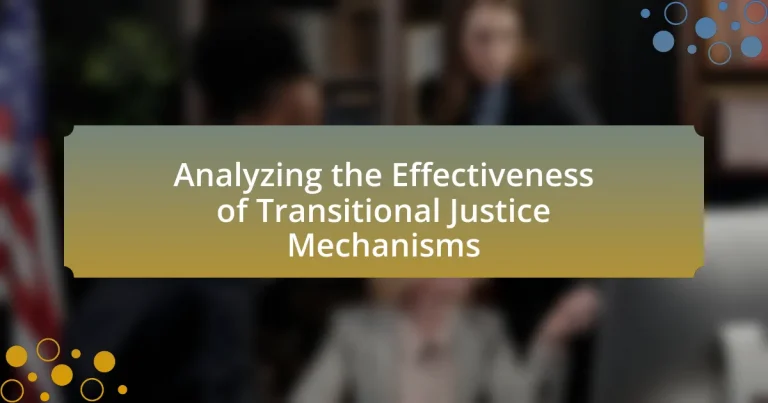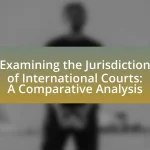Transitional Justice Mechanisms are processes aimed at addressing past human rights violations in societies emerging from conflict or authoritarian rule. This article analyzes the effectiveness of these mechanisms, including truth commissions, criminal prosecutions, reparations programs, and institutional reforms, in promoting accountability, reconciliation, and societal healing. Key components such as truth-seeking, accountability, and reparations are examined, along with their interactions and contributions to justice and peacebuilding. The article also discusses the challenges faced by these mechanisms, the role of public perception, and best practices for enhancing their effectiveness, drawing on successful case studies to illustrate their impact on post-conflict recovery.
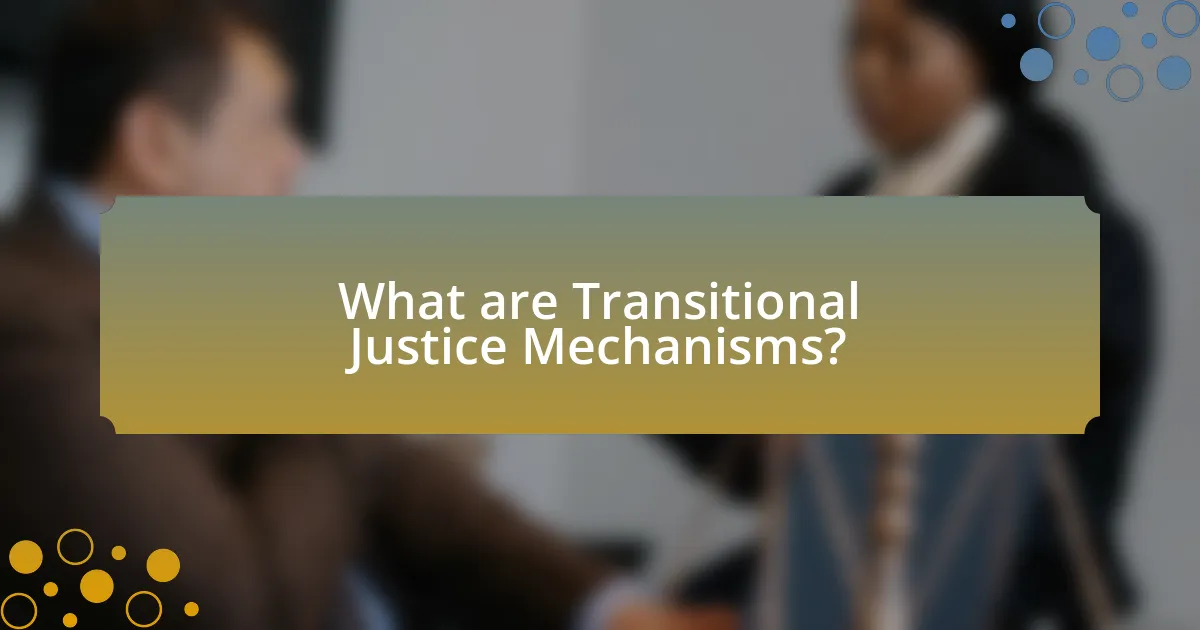
What are Transitional Justice Mechanisms?
Transitional Justice Mechanisms are processes and frameworks designed to address past human rights violations and promote accountability, reconciliation, and healing in societies transitioning from conflict or authoritarian rule. These mechanisms typically include truth commissions, criminal prosecutions, reparations programs, and institutional reforms aimed at ensuring justice and preventing future abuses. For instance, the Truth and Reconciliation Commission in South Africa was established to uncover the truth about past atrocities and foster national healing after apartheid, demonstrating the role of such mechanisms in facilitating societal recovery and justice.
How do Transitional Justice Mechanisms function in post-conflict societies?
Transitional Justice Mechanisms function in post-conflict societies by addressing past human rights violations and fostering reconciliation. These mechanisms, which include truth commissions, reparations, and criminal prosecutions, aim to provide accountability, promote healing, and establish a foundation for sustainable peace. For instance, the Truth and Reconciliation Commission in South Africa facilitated dialogue about apartheid-era abuses, allowing victims to share their experiences and perpetrators to confess, which contributed to national healing. Additionally, reparations programs, such as those implemented in Guatemala, aim to compensate victims and acknowledge their suffering, further reinforcing societal trust and stability.
What are the key components of Transitional Justice Mechanisms?
The key components of Transitional Justice Mechanisms include truth-seeking, accountability, reparations, and institutional reform. Truth-seeking involves establishing an accurate historical record of past abuses, often through commissions. Accountability refers to holding perpetrators of human rights violations responsible, typically through legal proceedings. Reparations provide compensation and acknowledgment to victims, addressing their suffering and restoring dignity. Institutional reform aims to transform state institutions to prevent future abuses, ensuring a commitment to human rights and the rule of law. These components collectively contribute to the healing process and the establishment of a just society following periods of conflict or repression.
How do these components interact to promote justice?
Transitional justice mechanisms, including truth commissions, reparations, and judicial processes, interact to promote justice by addressing past human rights violations and fostering societal healing. Truth commissions uncover and document abuses, providing a platform for victims to share their experiences, which helps validate their suffering and promotes acknowledgment of wrongdoing. Reparations offer tangible support to victims, facilitating their recovery and reinforcing the state’s responsibility for past injustices. Judicial processes hold perpetrators accountable, deterring future violations and reinforcing the rule of law. Together, these components create a comprehensive framework that not only seeks to rectify past wrongs but also aims to build a more just and equitable society, as evidenced by successful cases in countries like South Africa and Argentina, where these mechanisms contributed to national reconciliation and stability.
Why are Transitional Justice Mechanisms important for societal healing?
Transitional Justice Mechanisms are important for societal healing because they address past human rights violations and promote accountability, truth, and reconciliation. These mechanisms, such as truth commissions and reparations programs, facilitate the acknowledgment of suffering and foster dialogue among affected communities. For instance, the Truth and Reconciliation Commission in South Africa played a crucial role in healing the nation post-apartheid by uncovering the truth about past atrocities and allowing victims to share their experiences. This process not only helps restore dignity to victims but also contributes to building trust in institutions and preventing future conflicts, as evidenced by studies showing that societies engaging in transitional justice are less likely to relapse into violence.
What role do they play in addressing past human rights violations?
Transitional justice mechanisms play a crucial role in addressing past human rights violations by promoting accountability, truth-telling, and reparations for victims. These mechanisms, which include truth commissions, trials, and reparations programs, aim to acknowledge the suffering caused by abuses, facilitate healing, and prevent future violations. For instance, the Truth and Reconciliation Commission in South Africa helped uncover the truth about apartheid-era abuses, fostering national dialogue and reconciliation. Additionally, the International Criminal Court prosecutes individuals for war crimes and crimes against humanity, reinforcing the principle that perpetrators will be held accountable. Such efforts contribute to restoring trust in institutions and ensuring that victims receive recognition and justice.
How do they contribute to reconciliation and peacebuilding?
Transitional justice mechanisms contribute to reconciliation and peacebuilding by addressing past human rights violations and fostering accountability. These mechanisms, such as truth commissions and reparations programs, create a platform for victims to share their experiences, which helps to validate their suffering and promote healing within communities. For instance, the South African Truth and Reconciliation Commission facilitated dialogue between victims and perpetrators, leading to a greater understanding of the past and aiding in national healing. Additionally, transitional justice promotes rule of law and institutional reform, which are essential for sustainable peace, as evidenced by the establishment of legal frameworks in countries like Rwanda post-genocide, aimed at preventing future atrocities.
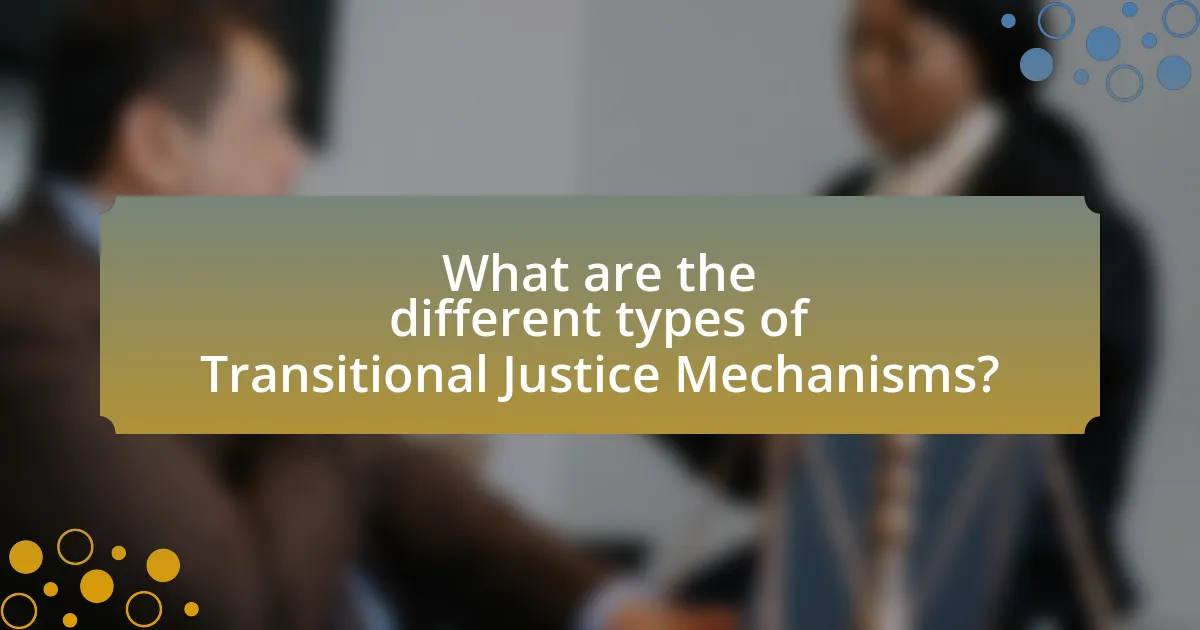
What are the different types of Transitional Justice Mechanisms?
Transitional justice mechanisms include truth commissions, criminal prosecutions, reparations programs, and institutional reforms. Truth commissions, such as South Africa’s Truth and Reconciliation Commission, aim to uncover past human rights violations and promote healing. Criminal prosecutions, like those conducted by the International Criminal Court, hold perpetrators accountable for atrocities. Reparations programs provide compensation to victims, as seen in various countries post-conflict. Institutional reforms focus on restructuring government and legal systems to prevent future abuses, exemplified by reforms in post-apartheid South Africa. Each mechanism serves distinct purposes in addressing legacies of violence and fostering societal reconciliation.
How do truth commissions operate within Transitional Justice frameworks?
Truth commissions operate within Transitional Justice frameworks by investigating and documenting human rights violations that occurred during periods of conflict or authoritarian rule. These commissions aim to uncover the truth about past atrocities, promote accountability, and foster reconciliation among affected communities. For instance, the South African Truth and Reconciliation Commission, established in 1995, provided a platform for victims and perpetrators to share their experiences, which helped to acknowledge the suffering caused by apartheid and facilitated national healing. By collecting testimonies and producing comprehensive reports, truth commissions contribute to historical record-keeping and can inform future policies to prevent recurrence of violence, thereby reinforcing the principles of justice and human rights within the broader Transitional Justice framework.
What are the objectives of truth commissions?
The objectives of truth commissions are to uncover the truth about past human rights violations, promote accountability, and foster reconciliation within societies transitioning from conflict or authoritarian rule. Truth commissions aim to document and acknowledge the experiences of victims, provide a platform for testimonies, and recommend measures for reparations and institutional reforms. Historical examples, such as the South African Truth and Reconciliation Commission, illustrate how these bodies can facilitate national healing and contribute to the establishment of a more just society by addressing grievances and preventing future atrocities.
How effective are truth commissions in uncovering historical truths?
Truth commissions are effective in uncovering historical truths, as evidenced by their ability to document human rights violations and provide a platform for victims’ testimonies. For instance, the South African Truth and Reconciliation Commission, established in 1995, revealed over 20,000 human rights abuses during apartheid, contributing significantly to the historical record. Additionally, truth commissions often promote national dialogue and reconciliation, as seen in countries like Argentina and Chile, where they facilitated public acknowledgment of past atrocities. These commissions rely on extensive witness accounts, archival research, and public hearings, which collectively enhance their effectiveness in establishing a factual narrative of historical events.
What is the role of criminal prosecutions in Transitional Justice?
Criminal prosecutions play a crucial role in Transitional Justice by holding perpetrators of serious human rights violations accountable, thereby promoting justice and deterring future crimes. These prosecutions serve to establish the rule of law in post-conflict societies, as evidenced by the establishment of international tribunals, such as the International Criminal Tribunal for the former Yugoslavia, which prosecuted war crimes and contributed to the documentation of atrocities. Furthermore, criminal prosecutions can facilitate societal healing by acknowledging victims’ suffering and providing a sense of closure, as seen in various national courts that have addressed past abuses. This accountability mechanism is essential for rebuilding trust in institutions and fostering a culture of respect for human rights.
How do prosecutions contribute to accountability?
Prosecutions contribute to accountability by holding individuals legally responsible for their actions, thereby reinforcing the rule of law. When legal proceedings are initiated against perpetrators of crimes, it serves as a mechanism to ensure that justice is served, which can deter future violations. Historical examples, such as the Nuremberg Trials, demonstrate that prosecuting war criminals not only provided a sense of justice for victims but also established legal precedents that affirm accountability for serious offenses. Furthermore, successful prosecutions can enhance public trust in legal institutions, as they signal that no one is above the law, thus promoting a culture of accountability within society.
What challenges do prosecutions face in transitional contexts?
Prosecutions in transitional contexts face significant challenges, including a lack of resources, political interference, and difficulties in gathering evidence. These challenges arise because transitional justice often occurs in environments where the rule of law is weak, and institutions may be underdeveloped or compromised. For instance, in post-conflict societies, the judicial system may be overwhelmed, lacking the necessary personnel and funding to handle complex cases. Political interference can further complicate prosecutions, as powerful actors may seek to obstruct justice for their own interests. Additionally, gathering evidence is often problematic due to the destruction of records during conflict and the reluctance of witnesses to come forward, fearing retaliation. These factors collectively hinder the effectiveness of prosecutions in achieving accountability and justice in transitional contexts.
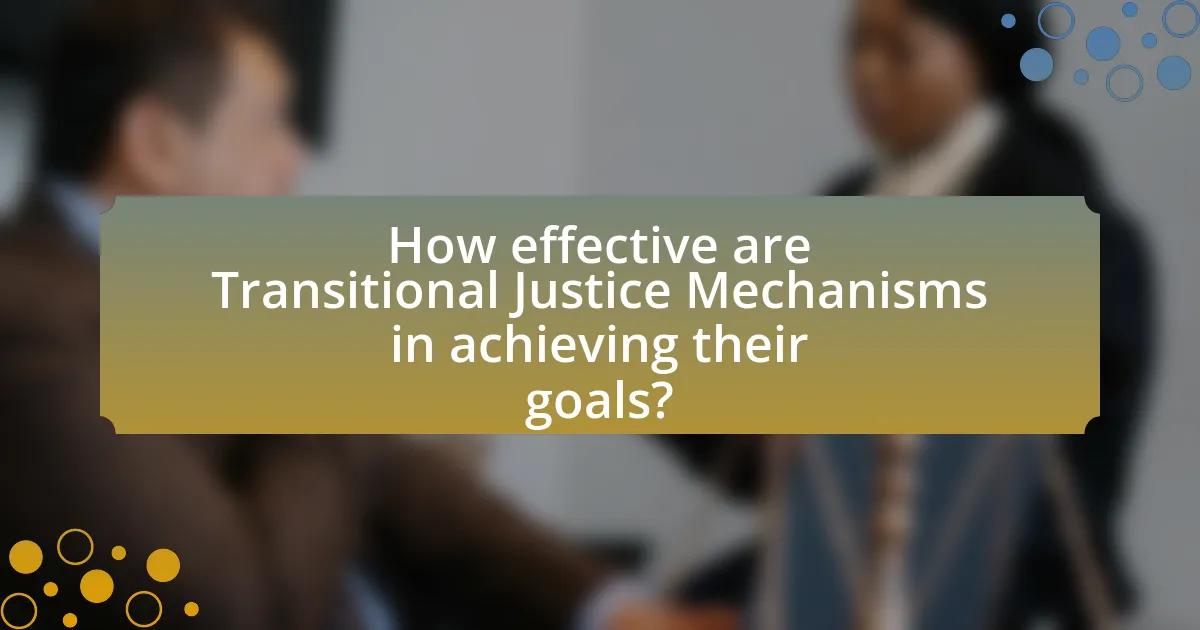
How effective are Transitional Justice Mechanisms in achieving their goals?
Transitional Justice Mechanisms are effective in achieving their goals, particularly in promoting accountability, reconciliation, and the rule of law in post-conflict societies. For instance, truth commissions, such as South Africa’s Truth and Reconciliation Commission, have been instrumental in uncovering human rights violations and fostering national dialogue, which is evidenced by the significant public engagement and acknowledgment of past atrocities. Additionally, legal prosecutions, like those conducted by the International Criminal Court, have contributed to deterring future crimes by holding perpetrators accountable, as seen in the conviction of war criminals from the Rwandan Genocide. These mechanisms collectively enhance societal healing and contribute to the establishment of democratic governance, demonstrating their effectiveness in addressing the legacies of conflict and injustice.
What metrics can be used to evaluate the effectiveness of Transitional Justice Mechanisms?
Metrics used to evaluate the effectiveness of Transitional Justice Mechanisms include victim satisfaction, accountability measures, and the extent of truth-telling. Victim satisfaction can be assessed through surveys that gauge the perceived fairness and impact of the mechanisms on individuals affected by past injustices. Accountability measures can be evaluated by the number of prosecutions and convictions of perpetrators, reflecting the legal responses to human rights violations. The extent of truth-telling is often measured by the volume and quality of testimonies collected, which can indicate the mechanisms’ success in uncovering historical truths. These metrics provide concrete data to assess the overall impact and effectiveness of Transitional Justice initiatives.
How do public perceptions influence the success of these mechanisms?
Public perceptions significantly influence the success of transitional justice mechanisms by shaping the legitimacy and acceptance of these processes. When the public views these mechanisms as fair and just, they are more likely to engage with and support them, leading to higher rates of participation and compliance. For instance, research conducted by the International Center for Transitional Justice indicates that public trust in judicial processes enhances the effectiveness of truth commissions and reparations programs, as communities are more willing to cooperate when they believe their voices will be heard and respected. Conversely, negative perceptions can lead to skepticism and resistance, undermining the intended outcomes of these mechanisms.
What evidence exists to support claims of effectiveness?
Evidence supporting claims of effectiveness in transitional justice mechanisms includes empirical studies demonstrating their impact on post-conflict societies. For instance, research by the International Center for Transitional Justice indicates that truth commissions can significantly contribute to reconciliation and reduce the likelihood of future violence, as seen in countries like South Africa and Sierra Leone. Additionally, a meta-analysis published in the Journal of Peace Research found that countries implementing transitional justice measures, such as reparations and trials, experienced improved human rights conditions and enhanced public trust in institutions. These findings collectively affirm the effectiveness of transitional justice mechanisms in fostering societal healing and stability.
What are the common challenges faced by Transitional Justice Mechanisms?
Transitional Justice Mechanisms commonly face challenges such as lack of political will, insufficient resources, and societal divisions. Lack of political will often results in inadequate implementation of justice processes, as seen in countries like Rwanda, where political leaders may resist accountability for past atrocities. Insufficient resources hinder the effectiveness of these mechanisms, limiting their ability to conduct thorough investigations and provide support to victims, as evidenced in various post-conflict settings. Societal divisions can exacerbate tensions, making it difficult to achieve consensus on justice measures, which has been observed in contexts like Bosnia and Herzegovina, where ethnic divisions complicate reconciliation efforts.
How do political contexts impact the implementation of these mechanisms?
Political contexts significantly influence the implementation of transitional justice mechanisms by shaping the political will, public support, and institutional capacity necessary for their success. For instance, in post-conflict societies, the presence of a stable government can facilitate the establishment of truth commissions and reparations programs, as seen in South Africa’s Truth and Reconciliation Commission, which was supported by a political transition towards democracy. Conversely, in politically unstable environments, such as Syria, ongoing conflict and authoritarian governance hinder the establishment of effective transitional justice mechanisms, leading to a lack of accountability and justice for victims. Thus, the political landscape directly affects the feasibility and effectiveness of these mechanisms in addressing past atrocities.
What role does societal engagement play in overcoming these challenges?
Societal engagement plays a crucial role in overcoming challenges associated with transitional justice mechanisms by fostering community involvement and building trust among stakeholders. Engaging society ensures that the voices of victims and affected communities are heard, which enhances the legitimacy and effectiveness of justice processes. For instance, research indicates that inclusive approaches, such as community dialogues and participatory decision-making, lead to higher levels of public support and compliance with transitional justice initiatives. A study by the United Nations Development Programme highlights that societies that actively involve citizens in transitional justice efforts experience more sustainable peace and reconciliation outcomes.
What best practices can enhance the effectiveness of Transitional Justice Mechanisms?
Best practices that can enhance the effectiveness of Transitional Justice Mechanisms include ensuring inclusivity, promoting victim participation, and fostering accountability. Inclusivity allows for diverse perspectives, which can lead to more comprehensive and representative outcomes. For instance, the Truth and Reconciliation Commission in South Africa successfully integrated various community voices, which contributed to its legitimacy and acceptance. Promoting victim participation empowers individuals and communities, as seen in the case of the International Criminal Court, where victim testimonies have significantly influenced proceedings. Lastly, fostering accountability through legal frameworks and institutional reforms is crucial; countries like Rwanda have demonstrated that establishing clear accountability mechanisms can deter future violations and promote societal healing.
How can stakeholder involvement improve outcomes?
Stakeholder involvement can improve outcomes by ensuring that diverse perspectives and needs are integrated into decision-making processes. This inclusivity fosters greater trust and legitimacy in transitional justice mechanisms, as stakeholders often possess valuable insights that can enhance the relevance and effectiveness of interventions. Research indicates that when stakeholders, including victims, community leaders, and civil society organizations, actively participate, the likelihood of successful implementation and acceptance of justice measures increases. For instance, a study by the United Nations Development Programme found that inclusive processes lead to more sustainable peace and reconciliation outcomes, as they address the root causes of conflict and promote social cohesion.
What lessons can be learned from successful case studies?
Successful case studies in transitional justice mechanisms demonstrate the importance of inclusivity, community engagement, and adaptability. These elements are crucial for fostering trust and ensuring that the processes resonate with affected populations. For instance, the Truth and Reconciliation Commission in South Africa effectively utilized community participation to address historical grievances, leading to greater societal healing and acceptance of the process. Additionally, successful case studies highlight the need for a tailored approach that considers the unique cultural and social contexts of the affected communities, as seen in the restorative justice practices in Rwanda, which focused on local customs and reconciliation. These lessons underscore that effective transitional justice requires a commitment to understanding and integrating the perspectives of those most impacted by conflict and injustice.
